Mario Scrocca
Mutual Understanding between People and Systems via Neurosymbolic AI and Knowledge Graphs
Apr 15, 2025Abstract:This chapter investigates the concept of mutual understanding between humans and systems, positing that Neuro-symbolic Artificial Intelligence (NeSy AI) methods can significantly enhance this mutual understanding by leveraging explicit symbolic knowledge representations with data-driven learning models. We start by introducing three critical dimensions to characterize mutual understanding: sharing knowledge, exchanging knowledge, and governing knowledge. Sharing knowledge involves aligning the conceptual models of different agents to enable a shared understanding of the domain of interest. Exchanging knowledge relates to ensuring the effective and accurate communication between agents. Governing knowledge concerns establishing rules and processes to regulate the interaction between agents. Then, we present several different use case scenarios that demonstrate the application of NeSy AI and Knowledge Graphs to aid meaningful exchanges between human, artificial, and robotic agents. These scenarios highlight both the potential and the challenges of combining top-down symbolic reasoning with bottom-up neural learning, guiding the discussion of the coverage provided by current solutions along the dimensions of sharing, exchanging, and governing knowledge. Concurrently, this analysis facilitates the identification of gaps and less developed aspects in mutual understanding to address in future research.
Procedural Knowledge Ontology (PKO)
Mar 26, 2025Abstract:Processes, workflows and guidelines are core to ensure the correct functioning of industrial companies: for the successful operations of factory lines, machinery or services, often industry operators rely on their past experience and know-how. The effect is that this Procedural Knowledge (PK) remains tacit and, as such, difficult to exploit efficiently and effectively. This paper presents PKO, the Procedural Knowledge Ontology, which enables the explicit modeling of procedures and their executions, by reusing and extending existing ontologies. PKO is built on requirements collected from three heterogeneous industrial use cases and can be exploited by any AI and data-driven tools that rely on a shared and interoperable representation to support the governance of PK throughout its life cycle. We describe its structure and design methodology, and outline its relevance, quality, and impact by discussing applications leveraging PKO for PK elicitation and exploitation.
Human Evaluation of Procedural Knowledge Graph Extraction from Text with Large Language Models
Nov 27, 2024



Abstract:Procedural Knowledge is the know-how expressed in the form of sequences of steps needed to perform some tasks. Procedures are usually described by means of natural language texts, such as recipes or maintenance manuals, possibly spread across different documents and systems, and their interpretation and subsequent execution is often left to the reader. Representing such procedures in a Knowledge Graph (KG) can be the basis to build digital tools to support those users who need to apply or execute them. In this paper, we leverage Large Language Model (LLM) capabilities and propose a prompt engineering approach to extract steps, actions, objects, equipment and temporal information from a textual procedure, in order to populate a Procedural KG according to a pre-defined ontology. We evaluate the KG extraction results by means of a user study, in order to qualitatively and quantitatively assess the perceived quality and usefulness of the LLM-extracted procedural knowledge. We show that LLMs can produce outputs of acceptable quality and we assess the subjective perception of AI by human evaluators.
Modelling Business Agreements in the Multimodal Transportation Domain through Ontological Smart Contracts
Sep 05, 2022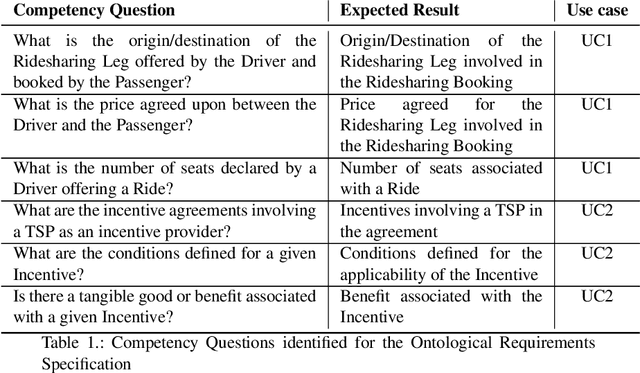

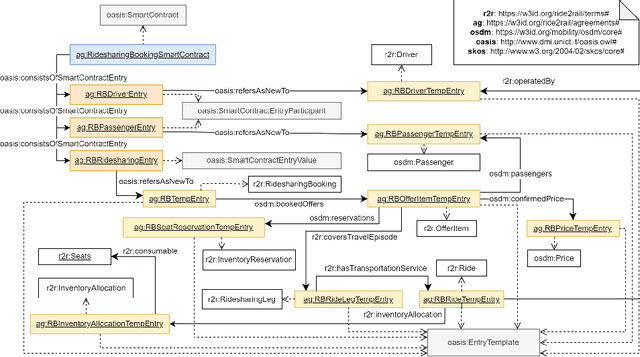
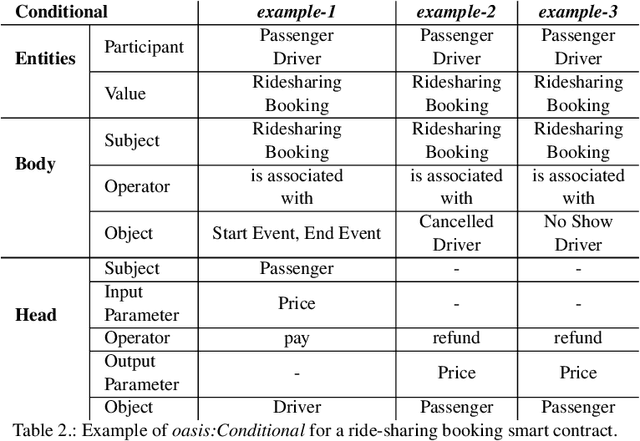
Abstract:The blockchain technology provides integrity and reliability of the information, thus offering a suitable solution to guarantee trustability in a multi-stakeholder scenario that involves actors defining business agreements. The Ride2Rail project investigated the use of the blockchain to record as smart contracts the agreements between different stakeholders defined in a multimodal transportation domain. Modelling an ontology to represent the smart contracts enables the possibility of having a machine-readable and interoperable representation of the agreements. On one hand, the underlying blockchain ensures trust in the execution of the contracts, on the other hand, their ontological representation facilitates the retrieval of information within the ecosystem. The paper describes the development of the Ride2Rail Ontology for Agreements to showcase how the concept of an ontological smart contract, defined in the OASIS ontology, can be applied to a specific domain. The usage of the designed ontology is discussed by describing the modelling as ontological smart contracts of business agreements defined in a ride-sharing scenario.
Turning Transport Data to Comply with EU Standards while Enabling a Multimodal Transport Knowledge Graph
Nov 12, 2020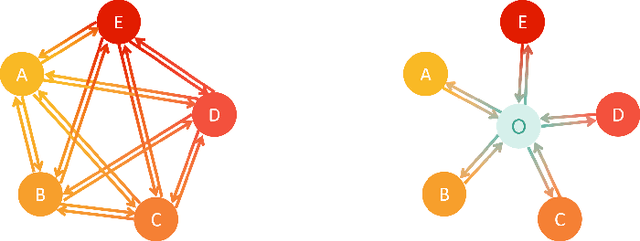
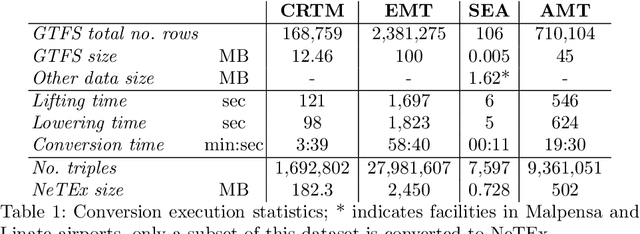
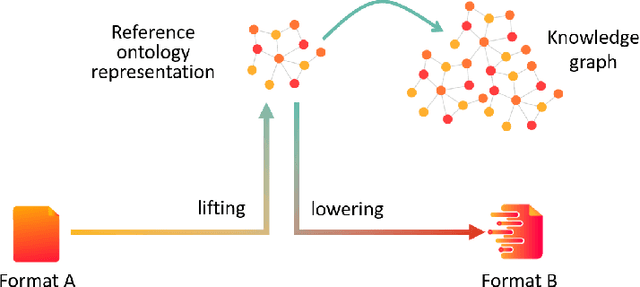
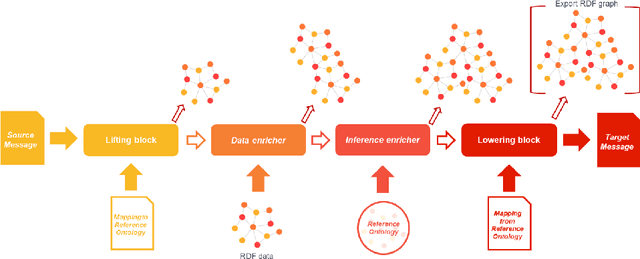
Abstract:Complying with the EU Regulation on multimodal transportation services requires sharing data on the National Access Points in one of the standards (e.g., NeTEx and SIRI) indicated by the European Commission. These standards are complex and of limited practical adoption. This means that datasets are natively expressed in other formats and require a data translation process for full compliance. This paper describes the solution to turn the authoritative data of three different transport stakeholders from Italy and Spain into a format compliant with EU standards by means of Semantic Web technologies. Our solution addresses the challenge and also contributes to build a multi-modal transport Knowledge Graph of interlinked and interoperable information that enables intelligent querying and exploration, as well as facilitates the design of added-value services.
 Add to Chrome
Add to Chrome Add to Firefox
Add to Firefox Add to Edge
Add to Edge